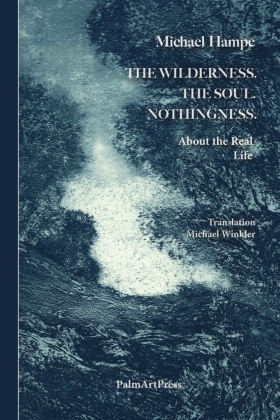
The Wildnerness. The Soul. Nothingness. - About the Real Life
| Verlag | PalmArtPress |
| Auflage | 2023 |
| Seiten | 400 |
| Format | 14,4 x 2,3 x 21,2 cm |
| Klappenbroschur | |
| Gewicht | 531 g |
| Artikeltyp | Englisches Buch |
| ISBN-10 | 3962581502 |
| EAN | 9783962581503 |
| Bestell-Nr | 96258150A |
Rezension:
Hampes Text hilft zu erkennen, wie uns die Unterscheidung zwischen Schein und Wirklichkeit daran hindert, mit unserem Leben wirklich klarzukommen. - Sachbuch-Bestenliste von ZEIT, ZDF und Deutschlandfunk Kultur
A fascinating philosophical-literary reflection,inviting us to examine the priorities in our own lives.What do we think about real life? About a retreat in untouched nature? About death and immortality? Through the lives of our children? These questions also preoccupy the fictional poet and philosopher Moritz Brandt. His friend Aaron sorts through his estate, coming across diaries and essays in which Brandt reflects on real life. The more he delves into these texts, however, the more frequently Aaron asks himself: Where does the desire to change, to become real, come from? Michael Hampe masterfully links narrative and reflection so that we recognize how the distinction between appearance and reality prevents us from coming to terms with our lives.
Leseprobe:
Seventeen years earlier, Emerson had introduced his essay on "Nature" with a reflection on his era in American history. He thought that the time in which he was living was a retrospective age, erecting memorials in honour of ancestors, writing biographies, engaging in historical reflections and critical analyses, whereas previous generations had still lived in an immediate relationship with "God and nature." Why, the author asks, "should not we also enjoy the original relation to the universe?" Instead of groping "among the dry bones of the past," Emerson exhorts us to avail ourselves of that "nature whose floods of life stream around and through us and invite us by the powers they supply to actions proportioned to nature." These are words that betray a dissatisfaction with or even a suffering from a life that has been mediated historically. Tradition appears as a burden that makes it impossible to perceive the world with upright honesty and fresh vision. It is no coincidence that in this connection Emerson speaks of the ancestors (he writes: fathers). He propounds the perspective of someone who does not yet feel that he is independent and has grown up. Europe, the continent from which one's mothers and fathers set off for America, continues to define the culture of those who were born in the USA as the children of immigrants. The cultures inherited from the parents' countries prevent the children from living in their own world. They appear compelled to go on looking at their country with the eyes of those who had trained their way of seeing in a different, older culture. The remedy to cure this affliction is envisioned as a return to nature that has not been determined by the history of old cultures, but that renews itself on its own. This return movement is expected to rejuvenate one's perspective and indeed one's whole situation in the world.
